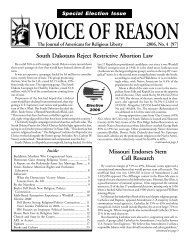The Importance of Church-State Separation - Americans for ...
The Importance of Church-State Separation - Americans for ...
The Importance of Church-State Separation - Americans for ...
Create successful ePaper yourself
Turn your PDF publications into a flip-book with our unique Google optimized e-Paper software.
14<br />
newer religious movements?<br />
<strong>The</strong> probability that attempts to teach about religion will go horribly<br />
wrong should caution public schools to “make haste very slowly” in<br />
this area. Perhaps other curricular inadequacies – less controversial<br />
ones, such as those in the fields <strong>of</strong> science, social studies, <strong>for</strong>eign languages,<br />
and world literature – should be remedied be<strong>for</strong>e we tackle the<br />
thorniest subject <strong>of</strong> all.<br />
<strong>The</strong> American landscape has no shortage <strong>of</strong> houses <strong>of</strong> worship,<br />
which generally include religious education as one <strong>of</strong> their main functions.<br />
Nothing prevents these institutions from providing all the teaching<br />
about religion that they might desire.<br />
<strong>The</strong> late Supreme Court Justice William Brennan summed up the<br />
constitutional ideal rather neatly in his concurring opinion in Abington<br />
Township S.D. v. Schempp, the 1963 school prayer case:<br />
It is implicit in the history and character <strong>of</strong> American public education<br />
that the public schools serve a uniquely public function: the<br />
training <strong>of</strong> American citizens in an atmosphere free <strong>of</strong> parochial, divisive,<br />
or separatist influence <strong>of</strong> any sort – an atmosphere in which<br />
children may assimilate a heritage common to all American groups<br />
and religions. This is a heritage neither theistic nor atheistic, but<br />
simply civic and patriotic. 33<br />
REPRODUCTIVE RIGHTS<br />
Freedom <strong>of</strong> conscience and freedom <strong>of</strong> choice in reproductive matters<br />
are <strong>of</strong>ten regarded as just “women’s issues.” <strong>The</strong>y are that, but they<br />
are also religious liberty and church-state issues and, beyond that, have<br />
a direct bearing on the global problems <strong>of</strong> overpopulation and sustainable<br />
growth. That they are religious liberty and church-state issues is<br />
attested to by the existence <strong>of</strong> the Religious Coalition <strong>for</strong> Reproductive<br />
Choice, founded in 1973, a coming together <strong>of</strong> <strong>for</strong>ty Catholic, Protestant,<br />
Jewish, Unitarian Universalist, and humanist denominations and<br />
groups that embrace a wide spectrum <strong>of</strong> views on reproductive matters<br />
but which agree on the importance <strong>of</strong> reproductive choice as a<br />
religious liberty issue. Arrayed on the other side <strong>of</strong> the question are<br />
powerful religious leaders representing the more conservative end <strong>of</strong><br />
the Catholic, Protestant, and Jewish spectrum. 34 It should also be noted<br />
that conservative religious opposition to choice has less to do with theology<br />
(the Bible is silent on abortion) than with a patriarchal bent toward<br />
male dominance.



